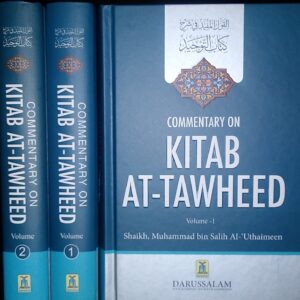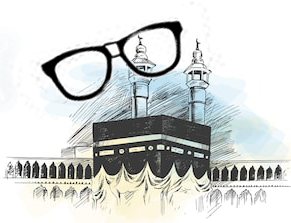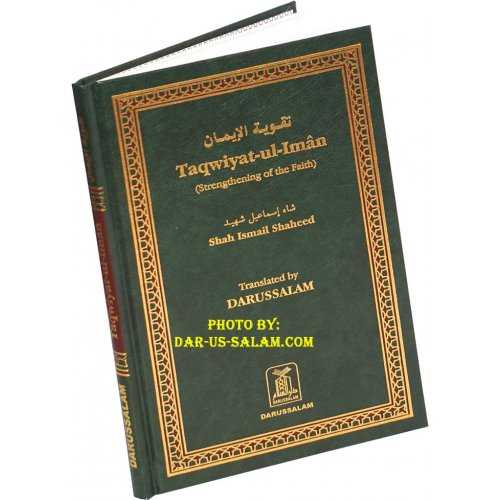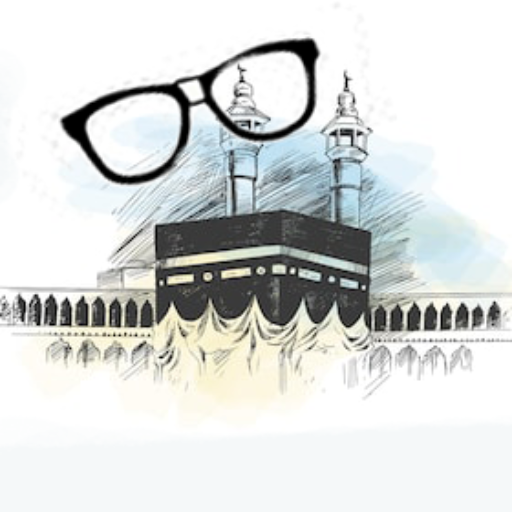The Prohibition of Observing Saum (Fasting) after the Middle of Sha’ban

Explanation of Hadith in Riyad-us-Saliheen
Imam Al-Nawawi’s Riyad-us-Saliheen – Chapter 219
The Prohibition of Observing Saum (Fasting) after the Middle of Sha’ban
Here are the ahadeeth in question from Imam Al-Nawawi’s Riyad-us-Saliheen – Chapter 219. Below them is the FREE lecture, given by Dawud Burbank several years ago. And below THAT are the various FATAWA about anticipating Ramadhan by fasting a day or 2 before it. Enjoy and please donate to our cause. Anything helps, wa jazakallahu khayr…
-
 Commentary on Kitab At-Tawheed$44.95
Commentary on Kitab At-Tawheed$44.95 -
Product on sale
 The Islamic Library (7 Books)Original price was: $128.00.$118.00Current price is: $118.00.
The Islamic Library (7 Books)Original price was: $128.00.$118.00Current price is: $118.00.
Imam Al-Nawawi’s Riyad-us-Saliheen
Chapter 219
The Prohibition of Observing Saum (Fasting) after the Middle of Sha’ban
1224. Abu Hurairah (May Allah be pleased with him) reported: The Prophet (sallallaahu alayhi wa sallam) said, “Do not observe Saum (fasting) for a day or two days preceding Ramadan. However, if a person is in the habit of observing Saum on a particular day (which may fall on these dates), he may fast on that day.”
[Al-Bukhari and Muslim].
1225. Ibn `Abbas (May Allah be pleased with them) reported: The Messenger of Allah (sallallaahu alayhi wa sallam) said, “Do not observe Saum (fasting) before the advent of Ramadan. Observe Saum at sighting of the crescent of Ramadan and terminate it at sighting the crescent (of Shawwal). If the sky is overcast, complete (the month as) thirty (days).”
[At-Tirmidhi].
1226. Abu Hurairah (May Allah be pleased with him) reported: The Messenger of Allah (sallallaahu alayhi wa sallam) said, “When there comes the middle of Sha`ban, don’t observe Saum (fasting).”
[At-Tirmidhi].
1227. `Ammar bin Yasir (May Allah be pleased with them) reported: He who observes the fast on a doubtful day, has in fact disobeyed Abul-Qasim, (i.e., Messenger of Allah (sallallaahu alayhi wa sallam)).
[Abu Dawud and At-Tirmidhi].
Lecture By Dawud Burbank
Do not anticipate Ramadan by fasting one or two days before it – Permanent Committee
Q: If it is cloudy or overcast, is it obligatory or prescribed to observe Sawm (Fasting) on the Day of Doubt (the 30th of Sha‘ban) as a precaution, in case the month has begun?
A: It is not permissible to perform Sawm on the Day of Doubt (so called because there is doubt concerning it – is it the last day of Sha’ban or the first day of Ramadan), even if the sky is cloudy, because the Messenger (peace be upon him) said,
“Fast when you see it (the new moon of Ramadan) and stop fasting when you see it (the new moon of Shawwal); but if the clouds obstruct your sighting of the new moon, complete the month of Sha‘ban thirty days.”
He (peace be upon him) also said,
“Do not precede Ramadan by fasting one or two days before it begins, unless for a person who observes a habitual pattern of Sawm, then let them fast it.”
As for what is narrated about Ibn ‘Umar (may Allah be pleased with him), that he used to observe Sawm on the 30th of Sha‘ban if it was cloudy, this was his Ijtihad (juristic effort to infer expert legal rulings), but the correct opinion is contrary to this; it is obligatory not to observe Sawm (on that day). Ibn ‘Umar practiced Ijtihad in this case, but his Ijtihad opposed the Sunnah (whatever is reported from the Prophet), may Allah forgive him!
The correct opinion is that the Muslims must not observe Sawm on the 30th of Sha‘ban, if the new moon of Ramadan is not sighted. If it is cloudy, it is obligatory not to observe Sawm. It is not permissible to start observing Sawm until the sighting of the new moon is confirmed or Sha‘ban is completed with thirty days. This is what is obligatory on Muslims, and it is not permissible to oppose the Nas (Islamic text from the Qur’an or the Sunnah) according to the words of one person, whether he is Ibn ‘Umar or anyone else, because the Nas (Islamic text from the Qur’an or the Sunnah) takes precedence over all opinions, as Allah (may He be Glorified and Exalted) says:
And whatsoever the Messenger (Muhammad peace be upon him) gives you, take it; and whatsoever he forbids you, abstain (from it) [Surah Al-Hashr 59:7].
He (may He be Glorified and Exalted) also says:
And let those who oppose the Messenger’s (Muhammad peace be upon him) commandment (i.e. his Sunnah — legal ways— orders, acts of worship, statements, etc.) (among the sects) beware, lest some Fitnah (disbelief, trials, afflictions, earthquakes, killing, overpowered by a tyrant) should befall them or a painful torment be inflicted on them. [Surah Al-Nur, 24: 63]
Source: http://www.alifta.net
‘Ammaar ibn Yaasir said: “Whoever fasts on the day concerning which there is doubt has disobeyed Abu’l-Qaasim (peace and blessings of Allaah be upon him).” This was narrated by al-Tirmidhi and classed as saheeh by al-Albaani in Saheeh al-Tirmidhi, 553.
Shaykh Ibn ‘Uthaymeen said in his commentary on the hadeeth “Do not anticipate Ramadaan by fasting one or two days before it begins…”:
The scholars (may Allaah have mercy on them) differed concerning this prohibition and whether it meant that this is haraam or makrooh. The correct view is that it means it is haraam, especially on the day of doubt.
Sharh Riyaadh al-Saaliheen, 3/394.
The scholars of the Standing Committee said concerning the day of doubt,
“The Sunnah indicates that it is haraam to fast this day.” (Fataawa al-Lajnah, 10/117)

Don’t forget to comment & share. Also please click our ads, they pay the bills. jazakallahu khayr.

